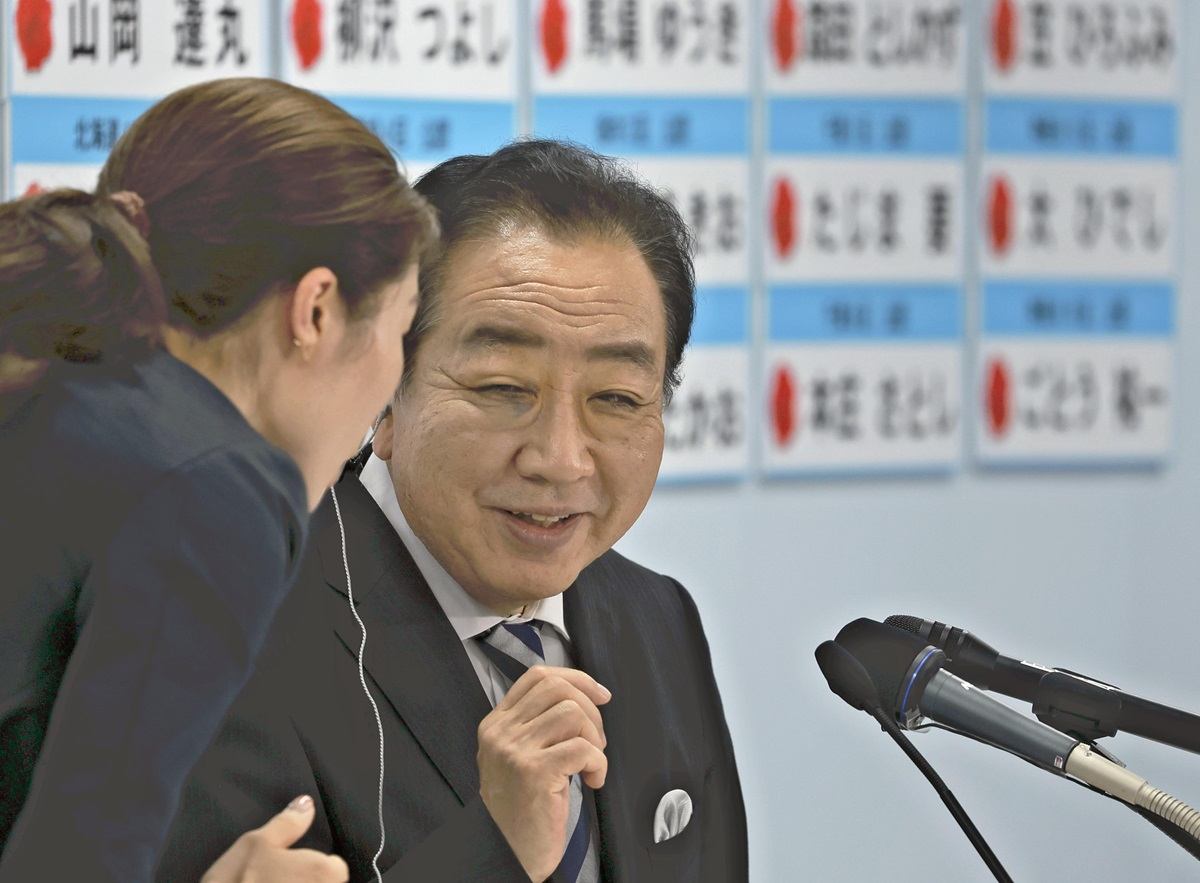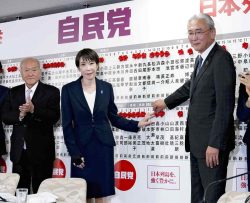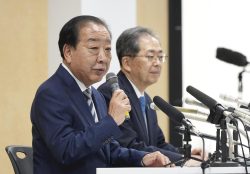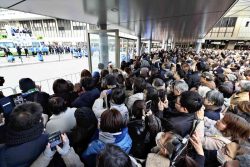Japan Election: CDPJ Eyes Bringing Together Anti-LDP Forces; Differences with DPFP, JIP Could Be Obstacles

Yoshihiko Noda, leader of the Constitutional Democratic Party of Japan, smiles on Sunday as counting continues in the House of Representatives election.
6:00 JST, October 29, 2024
Following the main opposition Constitutional Democratic Party of Japan’s gains in the House of Representatives election on Sunday, the party’s president Yoshihiko Noda is now turning his attention to bringing together parties who are against the ruling Liberal Democratic Party.
In its campaigning for the lower house election, the CDPJ called on the public to see the need to replace the government, emphasizing its resolve to thoroughly investigate the political fundraising scandal involving LDP factions.
Against the backdrop of voter frustrations over the politics and money issue and other problems, the CDPJ managed to drastically increase its number of lower house seats from 98 to 148.
In order to take over the reins of government, Noda will likely call on the Democratic Party for the People, which is backed by the Japanese Trade Union Confederation (Rengo), and the Japan Innovation Party for cooperation.
Noda had said he has no intention of forming a government with the Japanese Communist Party.
The CDPJ, the DPFP and the JIP believe in the need for political reform, with such measures as abolishing the provision of political activity expenses. On the other hand, Noda faced difficulties in unifying candidates among the opposition in some constituencies, including in those of former LDP lawmakers found to have failed to appropriately record income in their political funds reports. Consequently, the CDPJ competed against the DPFP in 13 constituencies and against the JIP in 115.
Regarding possible cooperation with the CDPJ, DPFP leader Yuichiro Tamaki repeatedly said it would be necessary for the two parties to agree on basic policies, such as diplomacy and security, energy policy — including nuclear power — and the Constitution.
As the two parties split from the now-defunct Democratic Party of Japan, some Rengo members expressed expectations for the parties to coordinate candidates. However, their policy negotiations failed to make progress partly because of differences in policy. While the DPFP calls for utilizing nuclear power and amending the Constitution, the CDPJ includes members who seek the abolition of nuclear power and oppose amending the Constitution.
The JIP, like the CDPJ, also aimed to push the LDP-Komeito coalition down to a minority in the election. But when the CDPJ sought cooperation in the election, JIP leader Nobuyuki Baba refused, saying, “We’d like to offer a number of options to voters.”
Speaking about the CDPJ in a news conference on Sunday night, Baba pointed out that the party has yet to be in agreement over basic policies. “If we form a coalition under such circumstances, it will cause confusion in the country.”
The JIP and the CDPJ have long been at odds with each other in the Kansai region — the JIP’s stronghold. Therefore, many CDPJ members think it would be impossible to collaborate with the JIP, with which it has battled in past elections, as a mid-ranking CDPJ member said.
Both the DPFP and the JIP have expressed their intention to face other parties, including the LDP, on equal footing. Noda’s ability will be put to the test in his efforts to bring non-LDP forces together.
Noda touts moderate stance
“Our strong criticism of the slush funds problem has worked out,” Noda said in a news conference early on Monday, referring to the LDP’s political fundraising scandal.
When official campaigning started on Oct. 15, Noda visited the constituencies of former LDP Policy Research Council Chairperson Koichi Hagiuda and former Economy, Trade and Industry Minister Yasutoshi Nishimura. As such, Noda demonstrated his focus on the political fundraising scandal in the election and intensively attacked former LDP lawmakers involved in the scandal.
Noda also directed criticism against Komeito, the LDP’s junior coalition partner. He accused the party of supporting former LDP lawmakers running in the election who had failed to appropriately list income in political funds reports, calling the party an “accomplice” of the LDP.
The CDPJ head also focused efforts on attracting voters critical of the administration, calling for political reforms such as banning political donations from companies and organizations.
Noda touted his party as taking a pragmatic middle-of-the-road line in an effort to attract moderate conservative voters and unaffiliated voters. The party is believed to have succeeded in becoming a receptacle of such voters.
The CDPJ did not list a “zero nuclear power” policy in its election pledges although it calls for realizing a “zero nuclear energy dependent society” in its party platform. Noda has argued that the Japan-U.S. alliance is the basis for the country’s diplomatic and security policies. Amid the increasingly tough security environment surrounding the country, he also touched on the necessity of boosting the defense capabilities of the country.
Top Articles in Politics
-

Japan PM Takaichi’s Cabinet Resigns en Masse
-

Sanae Takaichi Elected Prime Minister of Japan; Keeps All Cabinet Appointees from Previous Term
-

Japan’s Govt to Submit Road Map for Growth Strategy in March, PM Takaichi to Announce in Upcoming Policy Speech
-

LDP Wins Historic Landslide Victory
-

LDP Wins Landslide Victory, Secures Single-party Majority; Ruling Coalition with JIP Poised to Secure Over 300 seats (UPDATE 1)
JN ACCESS RANKING
-

Japan PM Takaichi’s Cabinet Resigns en Masse
-

Japan Institute to Use Domestic Commercial Optical Lattice Clock to Set Japan Standard Time
-

Israeli Ambassador to Japan Speaks about Japan’s Role in the Reconstruction of Gaza
-

Man Infected with Measles Reportedly Dined at Restaurant in Tokyo Station
-

Videos Plagiarized, Reposted with False Subtitles Claiming ‘Ryukyu Belongs to China’; Anti-China False Information Also Posted in Japan






















